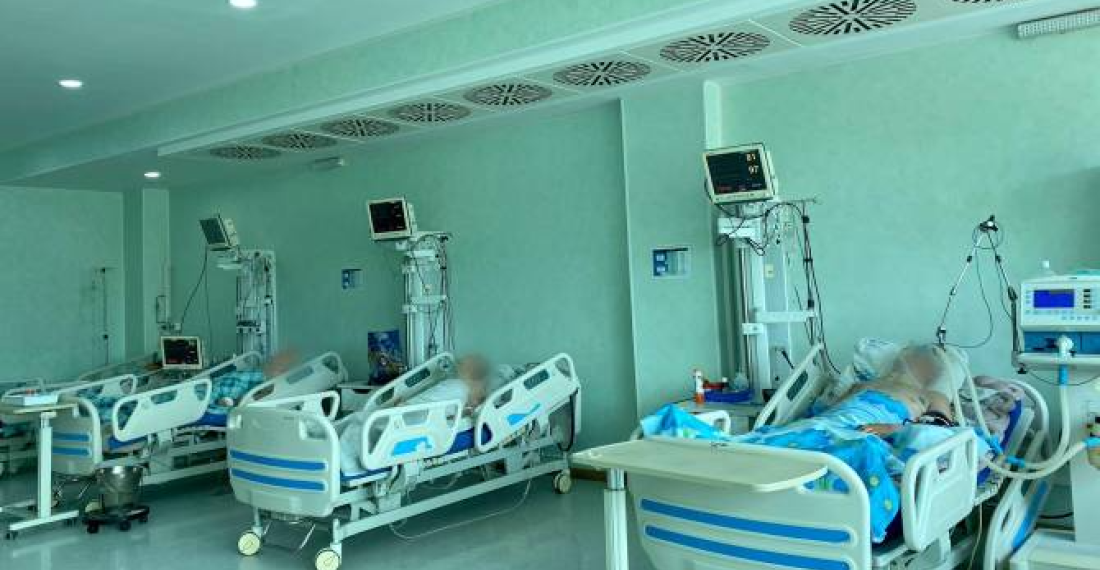De facto authorities in Nagorno-Karabakh on Monday (19 June) announced that they have suspended all non-essential surgeries and medical checkups in hospitals in the region as reports of shortages of medicines and other key supplies persist.
In a statement released on Monday, the Ministry of Healthcare of the self-proclaimed Nagorno-Karabakh Republic (NKR) said that "the two-way movement of patients from Nagorno-Karabakh and supplies of medical items and medicine by the International Committee of the Red Cross is completely blocked by Azerbaijan for already five days," referring to the outcome of an incident on the Hakari Bridge checkpoint on Thursday.
"Due to the halt of medicine imports, the medicine supplies in the stationary sector have dropped to 40%, and 20% in the outpatient sector. Taking into account the situation, all non-urgent checkups and interventions (surgeries) in all medical facilities are cancelled starting today."
The statement added that approximately 175 patients are waiting to be transferred to hospitals in Armenia, with some urgent cases suffering from cancer and cardiovascular diseases.
De facto NKR official Artak Beglaryan recently said that “there is already an acute shortage of quite a few items: medicines, some foodstuffs, gasoline and diesel fuel," while Eteri Musayelyan, an ICRC spokeswoman in Stepanakert, told RFE/RL’s Armenian Service that they are "monitoring the situation and remain in touch with all decision-makers", adding that they "hope to resume our work as soon as the situation allows".
Traffic via Hakari Bridge suspended since Thursday (15 June)
All traffic via the Azerbaijani checkpoint on the Hakari Bridge has been suspended since an incident on Thursday (15 June), including to Russian peacekeepers and International Committe of the Red Cross (ICRC) convoys who had served Nagorno-Karabakh's humanitarian needs for months.
At 08.40am on Thursday, Azerbaijani border guards crossed the Hakari Bridge from their checkpoint installed on 23 April and attempted to raise an Azerbaijani flag on the other side of the bridge, “on the territory of Armenia”.
A statement from the National Security Service of Armenia said that “as a result of the measures taken by the Armenian side, the advance of the Azerbaijani servicemen and the attempt to plant a flag on the territory of the Republic of Armenia were prevented.”
Azerbaijani sources also said that they killed two Armenian snipers in “retaliatory measures”, a claim that has not been corroborated by Armenia.
Later that day, Azerbaijani sources confirmed that the Hakari Bridge checkpoint had been closed “due to Armenian provocation”. As of Tuesday morning (20 June), it is understood that the checkpoint remains closed.
Months of reported shortages of key supplies in Nagorno-Karabakh
For months, de facto authorities and residents in Nagorno-Karabakh have complained of shortages of key supplies, including food, fuel, energy and medicines.
Reports of shortages began soon after self-proclaimed eco-protesters from Azerbaijan staged a picket along the Lachin Corridor connecting Armenia to Nagorno-Karabakh on 11 December last year, which Stepanakert argued constituted a "blockade" of the region. The picket came to an end shortly after Azerbaijan established a border checkpoint on the Hakari Bridge on 23 April, after the Corridor route changed on 30 March.
Azerbaijan meanwhile insisted that the road remained open for humanitarian purposes. Indeed, for several months, International Committee of the Red Cross (ICRC) convoys frequently evacuated critically ill patients from Nagorno-Karabakh to Armenia, while Russian peacekeepers also delivered humanitarian goods to Nagorno-Karabakh via the Lachin Corridor.
source: commonspace.eu with agencies
photo: Armenpress



